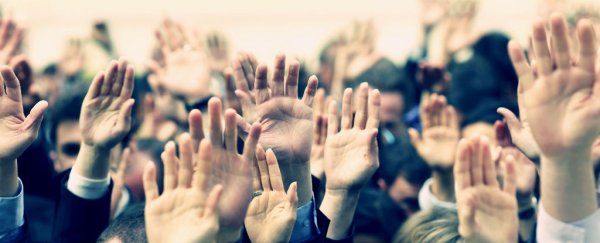Strange things happen to our memories when other people are involved: if someone else remembers an event in a particular way, for example, that can influence the way that we recall it. A shared store of knowledge - or a 'transactive memory system' - is more complex and comprehensive than any individual's memory, or so the hypothesis goes.
Journalist Malcolm Nicholson from Hope&Fears decided to ask the experts to see if groups of people could really 'remember' something that didn't actually happen, with the catalyst being Donald Trump's assertion that thousands of Muslims were cheering on the streets of New Jersey after 9/11 - an unsubstantiated version of events that around one-third of Republicans in a recent survey reportedly share.
Cornell University's Stephen Ceci recalls a classic psychology study from 1954 in which rugby players' recollection of a match varied depending on which side they were playing - each team felt the other was more aggressive.
He also points to cases of molestation where one child's claims are often backed up by further reports from the other kids, due to a combination of "social pressures… and various types of suggestion". Both can be used as examples of situations where 'group think' is in evidence.
"There are a few relevant studies that show people can hold distorted memories about significant public events," the University of Warwick's Kimberly Wade told Nicholson, pointing to the example of a study that found Americans were more likely to remember the discovery of weapons of mass destruction in Iraq than Germans or Australians.
"It's not inconceivable that this sort of thing can happen in a group setting," says Wade. "There are many studies showing that when two people witness the same event and discuss it, one person's memory report can contaminate what the other person subsequently claims to remember. This is called 'memory conformity' in the literature, and it's a very powerful and well-documented effect."
She adds that a lot of false memories are self-serving, designed to make us feel better about ourselves, our relationships, and our current situation.
"For some people, even if you were told a fact was wrong, you would still remember the previous incorrect fact," adds psychologist William Hirst. "This suggests that memory is schema consistent, so if something fits into the way you think things should be it, you don't easily revise the memory once it's been formed."
We let facts that don't fit with our worldview slip from our minds, Hirst told Hope&Fears:
"If somebody in the group says 'no that's not true', that will mitigate the influence. But for groups with a strong shared interest, like Trump supporters, they're less likely to dispute one another and therefore it's less likely for their memories to be updated."
So it would appear the answer is yes: what we choose to talk about with other people, and the way they reinforce (or don't reinforce) what we think has happened can cause false memories to get established. So remember: don't believe everything you hear.
